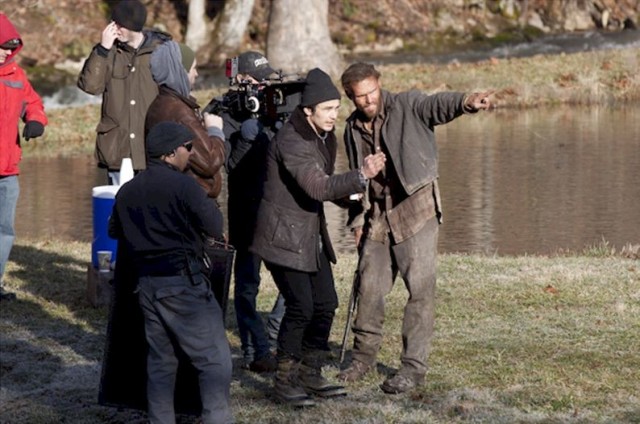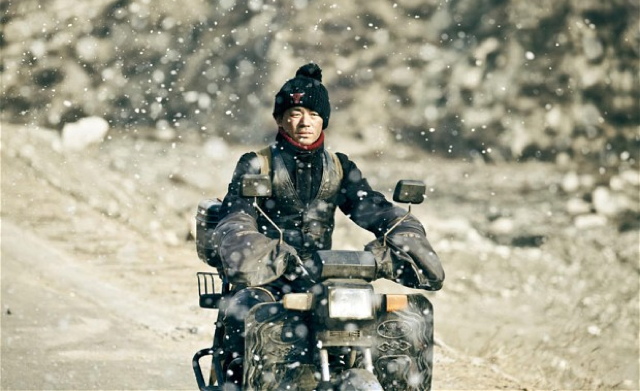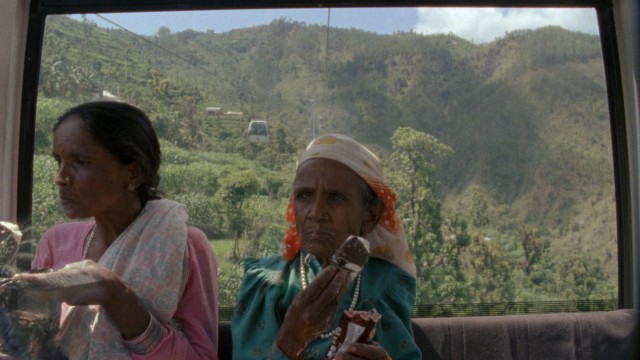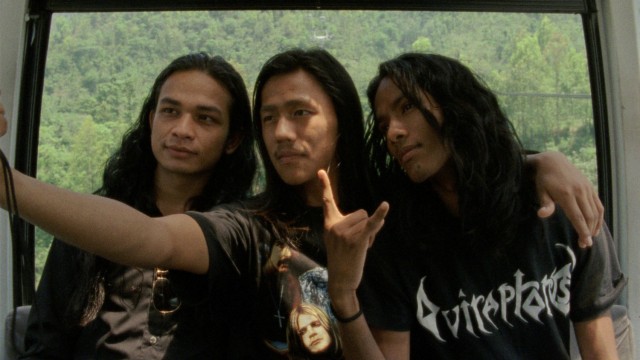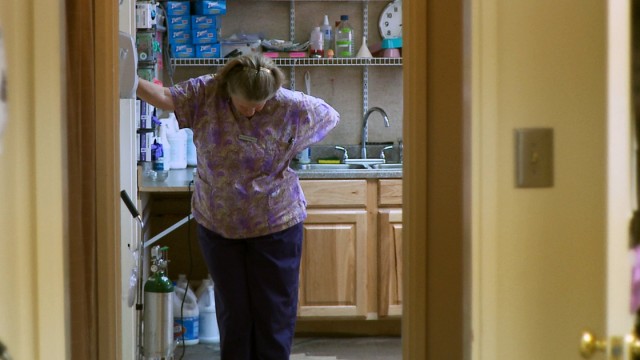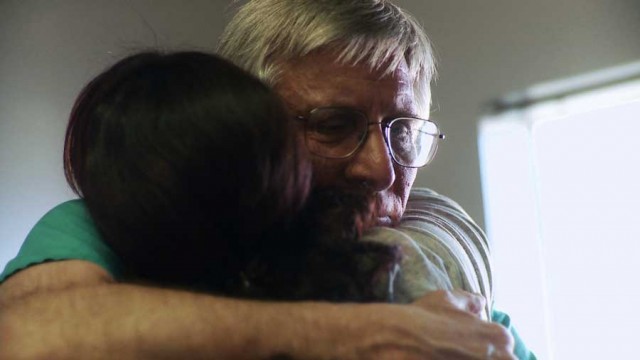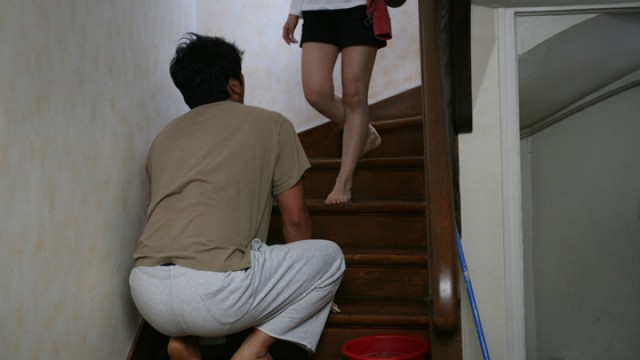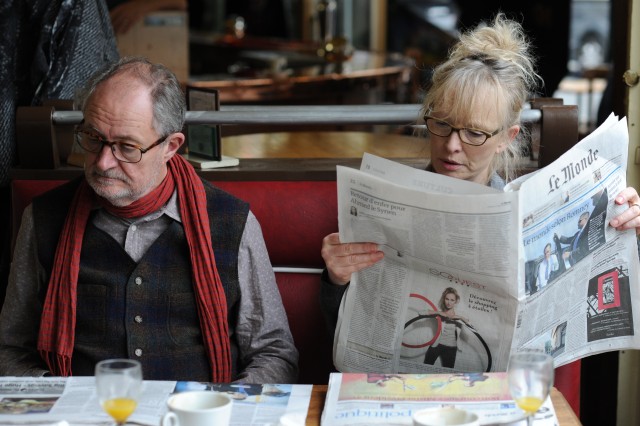
Nick (Jim Broadbent) and Meg (Lindsay Duncan) reevaluate their relationship while celebrating their thirtieth anniversary in Roger Michell’s LE WEEK-END
LE WEEK-END (Roger Michell, 2013)
Film Society of Lincoln Center
Alice Tully Hall, 1941 Broadway at 65th St.
Sunday, September 29, 6:00 pm
Walter Reade Theater, 165 West 65th St. between Broadway & Amsterdam Ave.
Monday, October 7, 6:00
Festival runs September 27 – October 13
212-875-5601
www.filmlinc.com
www.musicboxfilms.com
 Mike Nichols’s Who’s Afraid of Virginia Woolf? meets Richard Linklater’s “Before” series in Roger Michell’s bittersweet romantic black comedy, Le Week-end. Professor Nick Burrows (Jim Broadbent) and teacher Meg Burrows (Lindsay Duncan) are celebrating their thirtieth wedding anniversary by returning to Paris, where they spent their honeymoon. But whereas their first visit was filled with love, hope, and dreams of a bright future, they have come to the realization that their life together didn’t quite turn out as planned. While Nick still seems to be in love with his wife, Meg is reevaluating their relationship, continually lashing into him and spending what little money they have with reckless abandon. When they unexpectedly bump into an old colleague of Nick’s, the self-absorbed chatterbox Morgan (Jeff Goldblum), they are invited and go to a party where they imagine what could have been, forcing them to face some brutal truths.
Mike Nichols’s Who’s Afraid of Virginia Woolf? meets Richard Linklater’s “Before” series in Roger Michell’s bittersweet romantic black comedy, Le Week-end. Professor Nick Burrows (Jim Broadbent) and teacher Meg Burrows (Lindsay Duncan) are celebrating their thirtieth wedding anniversary by returning to Paris, where they spent their honeymoon. But whereas their first visit was filled with love, hope, and dreams of a bright future, they have come to the realization that their life together didn’t quite turn out as planned. While Nick still seems to be in love with his wife, Meg is reevaluating their relationship, continually lashing into him and spending what little money they have with reckless abandon. When they unexpectedly bump into an old colleague of Nick’s, the self-absorbed chatterbox Morgan (Jeff Goldblum), they are invited and go to a party where they imagine what could have been, forcing them to face some brutal truths.
Broadbent (Iris, Topsy-Turvy) and Duncan (Mansfield Park, Traffik) are marvelous together, inhabiting their roles with a beautiful grace, evoking what Jesse (Ethan Hawke) and Céline (Julie Delpy) might be like in the third or fourth sequel to Before Sunrise. Meanwhile, it’s hard to imagine anyone but Goldblum (The Fly, The Big Chill) playing the jittery Morgan so wonderfully. Director Michell and writer Hanif Kureishi, who previously collaborated on The Buddha of Suburbia, The Mother, and Venus, have created a very funny, honest, mature, and heart-wrenching portrait of a couple in sudden crisis after three decades of marriage, not necessarily knowing what, if anything, went wrong when. Le Week-end, which pays tribute to Jean-Luc Godard both in its title and in a late scene, is screening September 29 and October 7 at the fifty-first New York Film Festival, with Michell, Broadbent, Duncan, and producer Kevin Loader participating in a Q&A following the September 29 show at Alice Tully Hall.
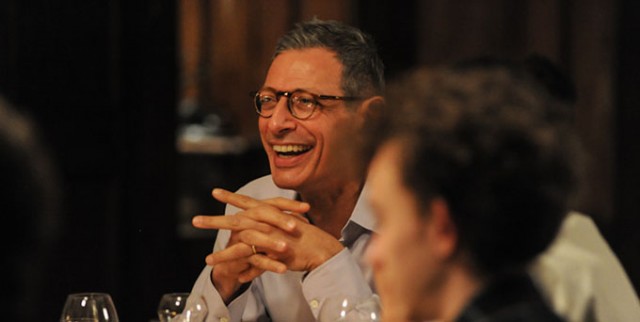
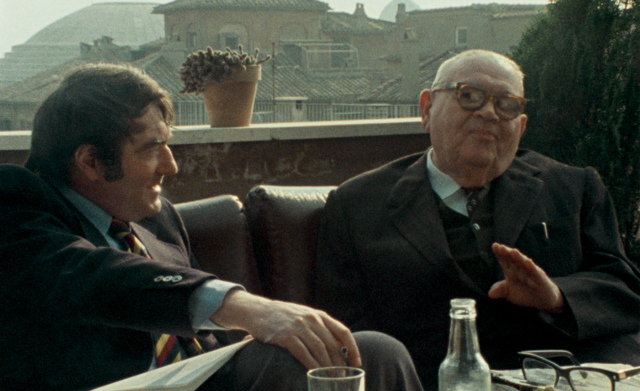
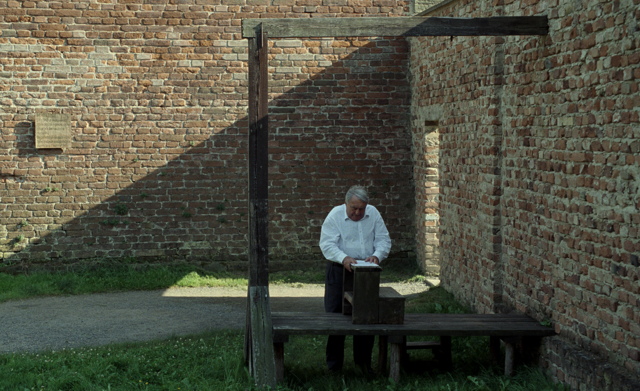
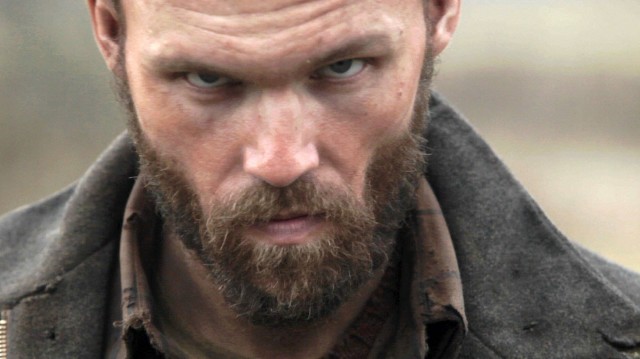
 In James Franco’s faithful, brutally compelling adaptation of Cormac McCarthy’s third novel, 1973’s Child of God, Scott Haze gives a courageous, unforgettable performance as Lester Ballard, a deeply disturbed man wreaking havoc on his small rural community in Sevier County in the Tennessee mountains. “His name was Lester Ballard, child of God, much like yourself, perhaps,” a narrator intones as the film opens. But Lester is not like everyone else. He is almost more animal than man, his speech hard to understand, his face hairy and rough, his gait hurried and uneven, a reclusive soul with no ability to differentiate between right and wrong, more at home in the woods and in caves than living among other people. When he lowers his head slightly and stares right into the camera, he evokes Charles Manson filtered through Charles Bukowski, with more than a touch of Jack Nicholson in The Shining; there doesn’t seem to be an ounce of humanity in him. (McCarthy has noted that Ballard was inspired at least in part by real-life serial killer Ed Gein, who also inspired Old Leatherface in The Texas Chainsaw Massacre and Norman Bates in Psycho.) Having been kicked off his family’s land, an angered Lester sleeps in a ramshackle cabin, venturing out primarily to kill an animal for food or to seek other carnal pleasures in his own, primal way. When he sees a young couple having sex in a car, his instinct is to get rid of the boy and take the girl for himself, with no thought of the consequences.
In James Franco’s faithful, brutally compelling adaptation of Cormac McCarthy’s third novel, 1973’s Child of God, Scott Haze gives a courageous, unforgettable performance as Lester Ballard, a deeply disturbed man wreaking havoc on his small rural community in Sevier County in the Tennessee mountains. “His name was Lester Ballard, child of God, much like yourself, perhaps,” a narrator intones as the film opens. But Lester is not like everyone else. He is almost more animal than man, his speech hard to understand, his face hairy and rough, his gait hurried and uneven, a reclusive soul with no ability to differentiate between right and wrong, more at home in the woods and in caves than living among other people. When he lowers his head slightly and stares right into the camera, he evokes Charles Manson filtered through Charles Bukowski, with more than a touch of Jack Nicholson in The Shining; there doesn’t seem to be an ounce of humanity in him. (McCarthy has noted that Ballard was inspired at least in part by real-life serial killer Ed Gein, who also inspired Old Leatherface in The Texas Chainsaw Massacre and Norman Bates in Psycho.) Having been kicked off his family’s land, an angered Lester sleeps in a ramshackle cabin, venturing out primarily to kill an animal for food or to seek other carnal pleasures in his own, primal way. When he sees a young couple having sex in a car, his instinct is to get rid of the boy and take the girl for himself, with no thought of the consequences.